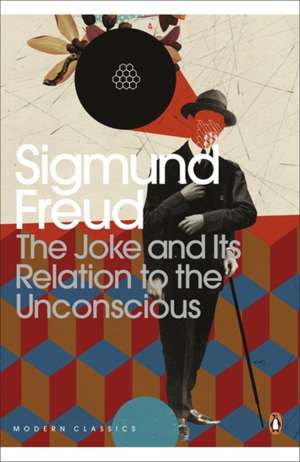The Joke and Its Relation to the Unconscious: Penguin Modern Classics - Freud
Autor Sigmund Freud Introducere de John Carey Traducere de Joyce Cricken Limba Engleză Paperback – 27 noi 2002
Building on the crucial insight that jokes use many of the same mechanisms he had already discovered in dreams, Freud developed one of the richest and most comprehensive theories of humour that has ever been produced.
Jokes, he argues, provide immense pleasure by allowing us to express many of our deepest sexual, aggressive and cynical thoughts and feelings which would otherwise remain repressed. In elaborating this central thesis, he brings together a dazzling set of puns, anecdotes, snappyone-liners, spoonerisms and beloved stories of Jewish beggars and marriage-brokers. Many remain highly amusing, while others throw a vivid light on the lost world of early twentieth-century Vienna.
| Toate formatele și edițiile | Preț | Express |
|---|---|---|
| Paperback (2) | 67.67 lei 24-30 zile | +22.38 lei 5-11 zile |
| Penguin Books – 27 noi 2002 | 67.67 lei 24-30 zile | +22.38 lei 5-11 zile |
| Penguin Books – 31 mai 2003 | 130.31 lei 3-5 săpt. |
Preț: 67.67 lei
Preț vechi: 81.64 lei
-17% Nou
12.95€ • 13.47$ • 10.69£
Carte disponibilă
Livrare economică 27 martie-02 aprilie
Livrare express 08-14 martie pentru 32.37 lei
Specificații
ISBN-10: 0141185546
Pagini: 288
Dimensiuni: 129 x 198 x 17 mm
Greutate: 0.2 kg
Editura: Penguin Books
Colecția Penguin Classics
Seria Penguin Modern Classics - Freud
Locul publicării:London, United Kingdom
Notă biografică
Sigmund Freud was born in 1856 and died in exile in London in 1939. As a writer and doctor he remains one of the great voices of the modern era.
Descriere
Building on the crucial insight that jokes use many of the same mechanisms he had already discovered in dreams, Freud developed one of the richest and most comprehensive theories of humour that has ever been produced.
Jokes, he argues, provide immense pleasure by allowing us to express many of our deepest sexual, aggressive and cynical thoughts and feelings which would otherwise remain repressed. In elaborating this central thesis, he brings together a dazzling set of puns, anecdotes, snappyone-liners, spoonerisms and beloved stories of Jewish beggars and marriage-brokers. Many remain highly amusing, while others throw a vivid light on the lost world of early twentieth-century Vienna.
Cuprins
Translator's Preface
A. Analytic Part
I. Introduction
II. The Technique of the Joke
III. The Tendencies of the Joke
B. Synthetic Part
IV. The Mechanism of Pleasure and the Psychological Origins of the Joke
V. The Motives for Jokes - The Joke as Social Process
C. Theoretical Part
VI. The Relation of the Joke to Dreams and to the Unconscious
VII. The Joke and the Varieties of the Comic


































